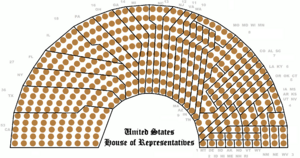Indirect democracy facts for kids
Indirect democracy, also known as representative democracy, is a way of governing where citizens choose people to represent them. These chosen people, called representatives, then make laws and decisions for everyone. Most countries today, like Canada, the USA, and India, use this system.
In a representative democracy, people pick their representatives through elections. Sometimes, the person with the most votes wins (a plurality). Other times, they need more than half the votes (a majority). There are different ways to choose these leaders.
This is different from Direct democracy, where citizens vote directly on every single law or idea. Long ago, some city-states in Ancient Greece used direct democracy. But with so many people in modern countries, it's usually only possible to vote directly on big issues occasionally, like in a referendum.
In any democracy, the people have the final say. They can decide how elections work. A main goal of democracy is to let citizens remove leaders they don't like and choose new ones. This power helps protect against bad government and unfair rule. Governments that don't let people change their leaders are not democratic. They are usually dictatorships or one-party states.
Contents
History of Representative Government
Early Forms of Representative Rule
The Roman Republic was one of the first places in the Western world to have a form of representative government. Even though they also had direct voting in their assemblies, the Roman system inspired many thinkers. Modern representative democracies often look more like the Roman model than the Greek one. This is because Rome was a state where the people and their chosen representatives held power. They also had elected or nominated leaders.
In medieval Europe, people started choosing representatives from different social classes. These representatives would advise or even control kings and queens. This tradition helped spread the idea of representative systems, which were inspired by the Roman way of doing things.
Key Moments in Britain
In Britain, Simon de Montfort is remembered as an important figure in representative government. He held two famous parliaments. The first, in 1258, limited the king's power. The second, in 1265, included ordinary citizens from towns. Later, in the 1600s, the Parliament of England developed ideas of liberal democracy. This led to the Glorious Revolution and the Bill of Rights 1689. These events gave more power to the people's representatives.
Representative Democracy in America
The American Revolution led to the creation of the U.S. Constitution in 1787. This new government had a national legislature. Part of it, the House of Representatives, was elected directly by the people every two years. This meant representatives had to listen to the voters to stay in office.
However, Senators were not directly elected by the people until 1913. This happened with the Seventeenth Amendment. Also, many groups of people could not vote at first. Women, men who didn't own property, and Black people slowly gained the right to vote over the 1800s and 1900s.
Changes in France
In 1789, Revolutionary France adopted the Declaration of the Rights of Man and of the Citizen. A short-lived assembly, the National Convention, was elected by all men in 1792. All men were able to vote again in France after the French Revolution of 1848.
Modern Representative Democracies
Representative democracy became very popular after the Industrial Revolution. Many people in new nation states became interested in politics. But the populations were too large for direct democracy. Technology also wasn't advanced enough for everyone to vote on everything.
Today, most people around the world live in representative democracies. This includes countries with kings or queens (constitutional monarchies) and republics. Both types of governments have strong representative branches.
See also
 In Spanish: Democracia representativa para niños
In Spanish: Democracia representativa para niños
 | Delilah Pierce |
 | Gordon Parks |
 | Augusta Savage |
 | Charles Ethan Porter |


